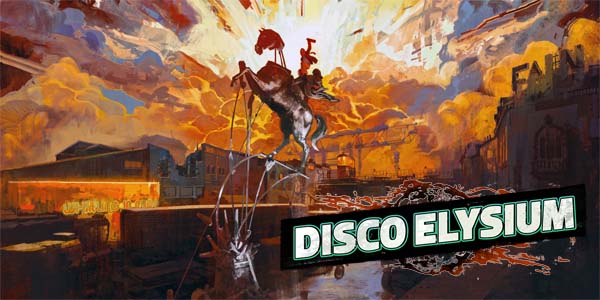
It's kind of hard to play a lot of video games while holding an infant child. It's certainly possible, but I had to accept that I was going to be less precise in my inputs whether I was holding a PlayStation controller or a keyboard and mouse. It seemed like a perfect time to try out a game that only requires a mouse to play -- a perfect time to finally try out Disco Elysium!
Disco Elysium is a unique and experimental RPG that straddles the line between RPG, point-and-click adventure, and walking sim. Most RPGs have combat of varying degrees of complexity in order to give all the various character stats and progression systems something to do. Disco Elysium completely eschews those conventions. I think I fired a gun maybe three times in my entire play time with the game (across a campaign and a half that I played prior to reviewing), and one of those gunshots was against a corpse hanging from a tree. Oh and I roundhouse kicked a a racist beefcake (you know, in order to establish my own racial superiority). Not exactly Call of Duty over here.
It may not require the twitch reflexes that many "gamer bros" expect every game to have, but games like this have been a godsend for those of us who only have one free hand to hold a mouse, because the other arm is holding a sleeping infant. It also happens to be a really good game.
I maybe fired a gun thrice, and roundhouse kicked a racist once, in 40+ hours of gameplay.
Inner dialogue
Instead of channeling character stats into gauntlets of filler combat encounters as a way of accumulating experience to improve those stats for the next combat encounters, Disco Elysium channels all of its character attributes into conversation trees. But these conversations aren't just with the other characters who I interview as part of the murder mystery plot. These conversations are also with the character's own inner monologue.
You see, the skills in Disco Elysium aren't like the skills of most other RPGs. They don't determine the character's physical strength, or agility, or skill with various weapons, or a blanket "charisma" attribute that determines if people believe your lies or are swayed by your arguments. No, instead, all of the skills of Disco Elysium represent elements of the protagonist's personality and psyche. Those skills will even pop up during dialogue and allow the character to have arguments or conversations with his own inner monologue. Each skill is like a voice in the protagonist's head, telling him what to do, or how to interpret the events he encounters. Each skill is sort of a character in its own right.
The character's skills talk to him, giving the player insight into the game world and current circumstances,
and also (sometimes flawed) advice about how to proceed.
I'm reminded of the psychosis voices of Hellblade: Senua's Sacrifice, with each voice shouting over the others trying to tell Senua what to do or telling her that she's worthless and can't do anything right. Except in Disco Elysium, the player can actually have conversations with those voices. You can talk back to them.
These skills will pop up from time to time as interjections during conversations to make observations about what is happening or to recommend specific courses or action or responses. It's also a great way of delivering exposition and ensuring that the player knows any relevant details that the character should know. But they aren't always completely reliable. Sometimes blindly following the advice of these skills can land you in trouble.
[More]
80bc8a20-3326-45b8-b069-a9aa846f0548|0|.0
Tags:Disco Elysium, Steam, PC, indie gaming, za/um studio, RPG, Estonia, point-and-click, walking simulator, skills, internal monologue, alcoholism, drug addiction, politics, union, strike, communism, fascism, nationalism, racism, sexism, liberalism, murder, mystery, police, crime
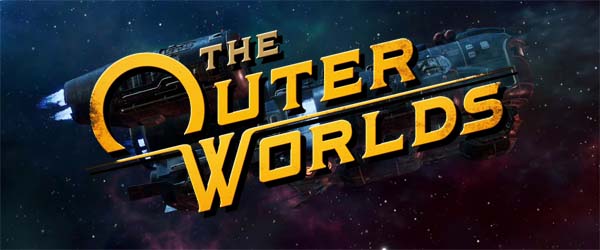
Obsidian Entertainment's follow-up to Fallout: New Vegas was a hotly-anticipated game for me, but it's timed exclusivity on the Epic Game Store meant that I had to wait an extra year to play it. I probably could have gotten it on console. I didn't because I was worried about performance limitations, but I don't recall reading or hearing too many complaints, so maybe it was fine on consoles. Ah well, much like Outer Wilds, I may have ended up waiting unnecessarily long to play The Outer Worlds. Unlike Outer Wilds, The Outer Worlds is not the instant-classic that I had hoped it would be.
Here I come to save the worlds!
The early hours of Outer Worlds seemed promising enough. The game is based largely around the same factional conflicts that drive the plot of Fallout: New Vegas, with the player dropping into an unfamiliar situation, and solving the locals' problems in one of several ways. Most quests will require the player to chose sides in a conflict and fight the opposing side, unless you have high enough speech skills to negotiate some kind of peaceful solution.
This sort of stuff is, of course, the highlight of the game. The relationships between quest-giving characters and their respective factions are like little puzzles for the player to figure out -- puzzles that can be solved equally effectively with kind words, as they can be with a gun, or sometimes both a kind word and a gun. Outer Worlds rewards the player for doing that little extra bit of due diligence to complete an optional objective, or to hack that terminal to find some juicy bit of intel that I can use to sway an NPC to give you what you want.
Players also assemble a crew of companion characters, each with a strongly-defined role. Each companion provides buffs to certain player skills. Parvati provides a buff to engineering skills, Ellie provides a buff to medical skills, Max provides buffs to hacking, and other characters provide various combat skill and intimidation buffs. These buffs can stack together and get quite large too, especially after you take one or two perks to improve them. I hardly ever needed to use food or drugs to buff a skill because my companion characters almost always provided me with enough of a boost to get me through most quests.
Players create a crew of companion characters to go questing with you.
I was actually surprised at how early in the game I had recruited all possible crew member. All but one come off of the first world, and the final one can be acquired on an early game quest on another world.
Which companions I take on a particular quest is, therefore, important. I found it was a good idea to pay attention to the dialogue from quest-givers to get a better idea of what lies ahead for me in a given quest. It's also worthwhile to check out the quest log to get any insight on what I'm expected to do. Going on a "bug hunt"? I'll take my heavy-hitters like Nyoka or Felix. Need to hack my way into a derelict outpost and get it operational again? Take Parvati and Max. Need to rescue some colonists who are trapped in a cave? Take Ellie and Nyoka in case anyone needs medical attention.
Or at least, that's how it works in principle. Remember when I said that the game seems promising in the beginning? Well that's because the opening chapter of the game is a very well-constructed vertical slice of everything that Outer Worlds has to offer. The downside is that, unlike Fallout: New Vegas (which has a similarly excellent opening chapter that serves as a vertical slice preview of the whole game), the whole rest of The Outer Worlds is just the opening quests repeated several more times on different planets, and it never gets much harder or more surprising.
In practice, there weren't very many quests that required diverse skills. I only specifically remember having to treat an NPC's wounds twice, and one of those was at the very start of the game before I had Ellie in my party anyway. Even though I kept taking Parvati whenever I thought I was going to need to repair things, there were still only a handful of engineering checks, and I recall them all being relatively easy. Honestly, I found that quests seemed to be much more dominated by speech checks, and my companions were mostly just bullet sponges and pack mules. [More]
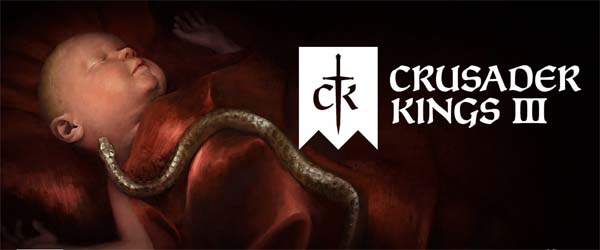
My blog readers know that I'm a fan of historic strategy games. Two of my favorite PC game franchises are Civilization and Total War, and I've dipped my hands into plenty of other historic strategy games ranging from the prehistoric Dawn of Man, all the way to Ultimate General: Civil War and Company of Heroes. But there's one prestigious set of historic strategy games that I've yet to get into. That is Paradox's historic strategy lineup of Crusader Kings, Europa Universalis, and Hearts of Iron. I own Crusader Kings II and Europa Universalis IV on Steam, and I've always wanted to get into them. I have a friend who plays them a lot, and the game looks really fun, but I was just never able to figure either of them out.
I tried booting up both a couple times and was just immediately overwhelmed. I tried the Crusader Kings II tutorial twice, and still didn't feel like I had a firm enough grasp on the game to feel compelled to keep playing. Part of that is because both games have myriad expansions and DLC that have just further complicated the games and repeatedly raised the bar of entry for newcomers. The only one of Paradox's tutorials that I felt gave me a reasonable grasp on the game was the tutorial for Stellaris.
When I saw previews for Crusader Kings III, I immediately put it on my watch list and committed myself to buying it day one, so that I could get in on the ground level in the hopes that it will be easier to grasp before Paradox starts releasing countless DLCs. It seems to have paid off, as I've been hooked on the game on and off since launch, and that addiction has cut into my Civ playing time, as well as delayed many of my blog projects and YouTube content. So for those of you eagerly awaiting new Civ strategies or the next installment of "How Madden Fails to Simulate Football", you can blame Paradox Interactive for the delay...
I am not the state
As someone who was never able to get into the previous game, I cannot say if Crusader Kings III is "dumbed-down" compared to its predecessor. It is, after all, still insanely complicated. But I definitely feel like it has a gentler learning curve and a much more effective tutorial compared to its predecessors. The hand-holding of the tutorial really did help me get a better understanding of how the various mechanics were working, and I've also found it much easier to navigate the revised U.I. and find the information that I'm looking for. I still feel like I have no idea what many of the U.I. panels mean, but I at least understand enough of the basics this time around to actually feel comfortable playing the game.
If you're unfamiliar, Crusader Kings is a medieval grand strategy game in which you play as the king of a small, European (or Middle Eastern or African) kingdom. You engage in diplomacy and court intrigue to increase your wealth and power, fight wars to conquer territory, and manage your growing holdings. But unlike a game like, say Civilization, you do not play as an abstraction of the state itself. Instead, you play as a line of rulers in a single family dynasty. You play as a single king (or queen) character at any given time. This king grows old, and eventually dies, at which point, you take control over you chosen heir and continue playing the game as that character. If you ever get to a point in which you have no family heir to carry on when you die, it's Game Over.
When your player character dies, you take over as that character's primary heir.
As much improved as the tutorial is, I do feel that it has one glaring weakness: it doesn't really cover succession. The tutorial basically puts you in control of a 40-year-old king in Ireland. It shows you how to press a few claims, use a casus belli to press those claims, create a title, deal with vassals, marry off a child, and then it basically just hands you the reigns and says "OK, now keep playing". And yeah sure, these are all the things that you spend most of the game doing. But I would say that arguably the most important part of the game is declaring your heir and setting up your inheritance to maximize the territory that your primary heir retains power over. I think succession is the single most important part of the game, and the tutorial doesn't cover it at all. When it finally happens, there's a tool tip that pops up to explain some stuff, but it didn't really help me all that much to understand what was happening, and a tool tip popping up after the fact certainly didn't help me to prepare for my king's inevitable death and inheritance. [More]
eb8fb312-cf3a-447e-aaf9-982c809e4e0e|0|.0
Tags:Crusader Kings, Crusader Kings 3, Paradox Interactive, Paradox Development Studio, strategy, grand strategy, RPG, history, simulation, medieval, king, Europe, crusades, war, casus belli, dynasty, inheritance
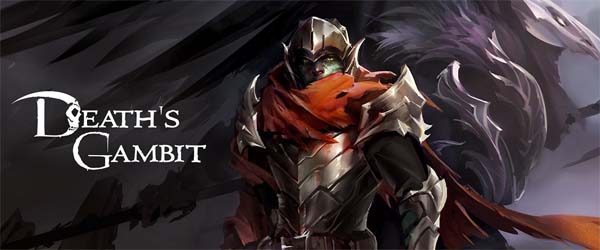
Being that Death's Gambit is produced by Adult Swim, I wasn't sure if it was going to turn into an outright parody of Dark Souls. Was this going to be some kind of comedic satire? Or a serious and thoughtful game? Or just a mindless hack-n-slash with little regard paid to story or narrative. It surely wastes little time before mocking Dark Souls.
-
-
Death's Gambit wastes little time before mocking Dark Souls.
Much of the game's design is blatantly inspired by Dark Souls, except for the title's font, which is evocative of Demon's Souls. From the menus, to the character creation screen, to the main character's armor that looks suspiciously like Artorias of the Abyss' armor, to the death mechanics, you'll see Dark Souls mirrored in almost every element of the Death's Gambit's design. As such, it's very hard to judge Death's Gambit without appealing back to the game(s) that so clearly inspired it.
Music is one strange element of production in which Death's Gambit deviates considerably from its inspiration. The main menu music is reminiscent of old-school RPGs, such as Final Fantasy X, rather than silence, and this trend of not being silent extends to the rest of the game. Instead of a mostly-quiet experience with calming strings in the hub and an intense orchestra for boss battles, Death's Gambit has pretty constant background music as you traverse the world. This makes the music, overall, feel less memorable, as it kind of just disappears into the background. The background music for the Central Sanctuary reminds me of Resident Evil's save room while I'm listening to it, but I can't actually remember what it sounds like once I stop playing.
Lessons from Dark Souls
Death's Gambit is, sadly, plagued by a lot of nagging little problems and lack of polish. Some of them are even issues that have been present in the Souls games, but which have been fixed (or at least addressed) by FromSoft in sequels. In these cases, White Rabbit should have known better. The most egregious of such offenders might be the inability to purchase multiple copies of any given consumable at a time. The Buy screen doesn't tell you how much of a given item you already have, and the Enchant screen doesn't tell you which items are equipped. If you use up all of a given consumable, it's removed from your item bar, and if you buy more, they are not put back into your item bar.
Nagging annoyances include text and foreground decorations obstructing the action.
The game also puts text overlays on the screen, sometimes while enemies are present. You can't read the text while you're focusing on not dying, but the text also gets in the way of the action. It's nice that they make sure that the player sees some of the important lore that you find, but don't do it if you're going to have enemies attack the player at the same time!
To top it all off, a lot of the text is really small and difficult to read, with no option to enlarge it. If you're playing on a console, sitting more than about 8 feet from the TV, you will probably have to lean forward and squint to read most of these menus... [More]
c23844db-143a-4cf1-b9e8-a168d854484a|0|.0
Tags:Death's Gambit, Adult Swim Games, White Rabbit, RPG, death, respawn, resurrection, boss, pheonix, grinding, horse, fast travel, Dark Souls
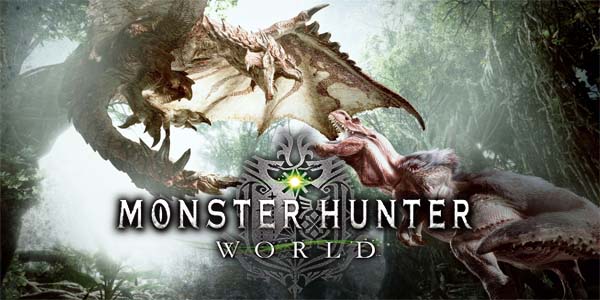
I've been playing Monster Hunter: World off-and-on since it was released (which was a few months ago at this point), and I'm still just not sure that I get it yet. The game just hasn't clicked for me. Maybe I haven't invested quite enough time yet. In the past, I've come around to games that initially turned me off with their tedium and/or difficulty. Demon's Souls is perhaps the prime example, as that game took a few days (almost a week) of banging my head against the walls of the Boletarian Palace before things started to click for me. It certainly didn't take months! Once Demon's Souls started to click, the game almost immediately became one of my all-time favorites.
The Demon's Souls comparison is apt. Corners of the internet keep insisting that Monster Hunter: World is a game that should appeal to the same types of players who love Dark Souls (because everybody keeps forgetting that Demon's Souls did it first and better). Well, I'm sorry, but I just don't see how the two connect.
Yeah, there's the difficulty. But Dark Souls isn't good because it's hard. It's good because all the pieces around that central challenge make overcoming that challenge feel worthwhile. It's the world-building, the lore, the way that the obtuse characters and dialogue builds a growing sense of intrigue about the world, the sense of nervously tip-toeing into a dangerous unknown, the sense of leveling your stats into a character build that perfectly suits your desired playstyle, and that ominous sense of entropic dread that permeates every nook and cranny of the game. Those things make Dark Souls good! Those sorts of things are lacking in Monster Hunter: World.
The JRPG nonsense that usually turns me off of JRPGs
Sadly, Monster Hunter: World is bogged down by a lot of the kinds of JRPG nonsense that has frequently turned me off of playing these sorts of games. While I often appreciate that JRPGs tend to be more story and character-driven (something that I often wish western RPGs would focus more on), JRPGs also tend to undercut the seriousness of the stories they're trying to tell with lots of silliness and whimsy. Sometimes it's charming or endearing; other times it's juvenile or obnoxious.
You can track monsters by following their footprints or by studying their snot and turds.
I can tolerate this game's silly little cat side kicks. Monster Hunter's whimsical fantasy setting works well enough. What is less tolerable is that the game is littered with tedious, grindy, time-killer quests: harvest so many mushrooms, investigate a bunch of dinosaur footprints and [literal] crap, kill however many small monsters, capture yet more small monsters. and yadda yadda yadda. I guess, at a certain level, these activities make a certain amount of sense. Your character is, after all, one grunt in a whole army of grunt hunters being sent out to do the dirty work of the captains. But I have better things to do in real life than to wander around a forest picking flowers for 50 minutes.
Monster Hunter is loaded with grind quests.
Some of these sorts of quests are relegated to little ambient side-quests that you can perform while you're doing other major missions. These are the ones that are tolerable. Others (like the Investigations and other tangential story quests) require you to perform dedicated ingredient-gathering grind missions, in which the sole purpose of the mission is to fight monsters you've already fought and collect a bunch of stuff. Since my character doesn't have traditional stats or levels that improve as I complete these quests, the grinding just never really feels worth it.
I was hoping that I could just power through the main quests and skip all the tedious grind stuff. No such luck. I got to a point where I had to hunt the T-Rex-like Anjanath, and got stuck... [More]
1b9f660c-f850-4553-965f-73076071e14f|3|3.0
Tags:Monster Hunter, Monster Hunter: World, Capcom, JRPG, RPG, dinosaur, dragon, palico, cat, pet, monster, grinding, time limit, hunt, nature, research, ecosystem, food chain, asynchronous multiplayer
|

| 12 | | | | | | | 60 | | 11 | | | | | | | 55 | | 10 | | | | | | | 50 | | 09 | | | | | | | 45 | | 08 | | | | | | | 40 | | 07 | | | | | | | 35 | | 06 | | | | | | | 30 | | 05 | | | | | | | 25 | | 04 | | | | | | | 20 | | 03 | | | | | | | 15 | | 02 | | | | | | | 10 | | 01 | | | | | | | 05 |
|